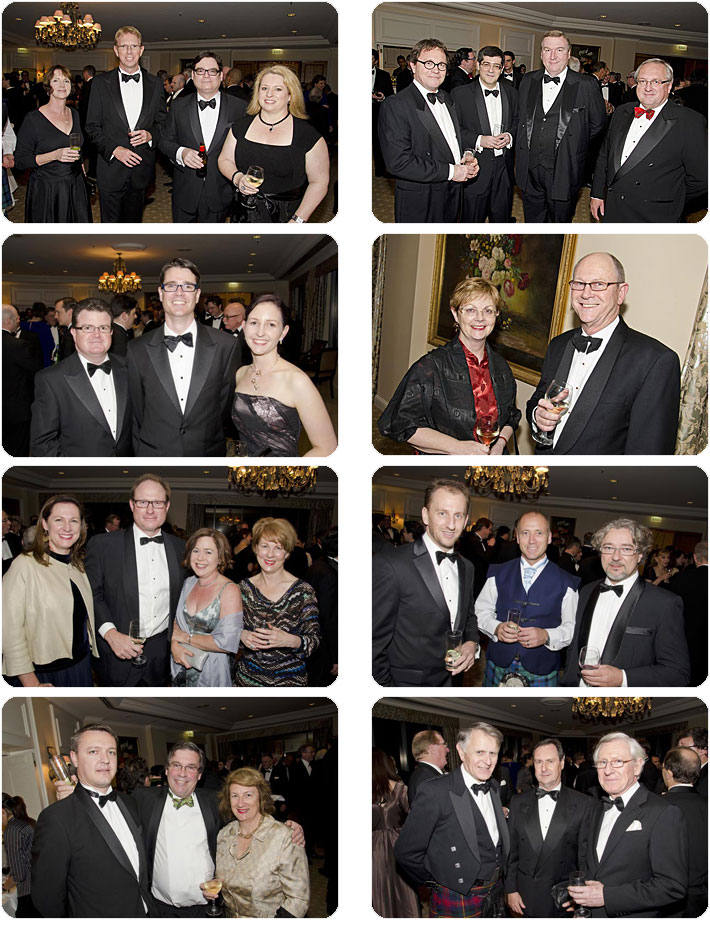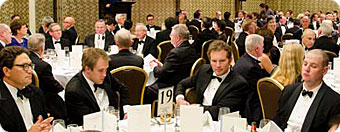Chief Justice de Jersey, Justice Kiefel, Chief Justice Keane, President McMurdo, Chief Judge Wolfe, your Honours, Mr Attorney, Mr President, distinguished guests, ladies and gentlemen.
Thank you all for the toast and thank you, Sandy, for your sympathetic and sensitive portrayal of judicial humour. I am sure you intended us to see it that way.
I am not sure what qualifies me to speak on behalf of the Judges. I haven’t been one of them for long. Probably it’s a trust that I know too little to be dangerous. It is tempting to betray that trust; but this evening I won’t … intentionally, anyway.
I can’t speak tonight from any depth of experience about life on the bench. But I can tell you that the process of becoming a judge can have its moments of tension.
Some months ago now, our suburb of Brookfield was in the national media spotlight. A woman had been reported missing on a Friday morning. That weekend the area was criss-crossed by helicopters following creek lines and covering acreage properties. I checked out our place and didn’t find anything unusual.
The following Monday morning, I received a phone call at work. Could I see the Attorney at his chambers at 5.30 that evening? At very considerable personal inconvenience and disruption to my regular Bridge commitment I might say, I did see my way clear to agree to do so. I need say only that it was a most amicable occasion and that events moved swiftly thereafter.
I knew that a recommendation was to go to the Governor-in-Council that Thursday. What I didn’t know was that our house was in the police investigation hot zone. Apparently someone had reported hearing screams near our place on the night of the disappearance. The police interest was evident. On the Wednesday, they were in the street on horseback. The search was on.
I woke up with a start on the Thursday. The kind of start you have when you look at the law list in the morning and see who you’ve drawn in the Court of Appeal. I realised I hadn’t checked under our carport. What to do? If I reported a body, that could throw a real spanner in the works; but if I didn’t, and the police found one there, it could be worse. Once again, foolhardiness got the better of me. I gingerly climbed down the bank and peered up under the carport. To my great relief there was nothing there.
The whole experience unsettled Helen too. She was a little distracted by all these goings-on. That day she was visited by two gentlemen in blue. They had a long list of questions. They were interested in her car — but she couldn’t remember the number plate. They wanted to know who lived there. Happily, she did remember that she was married to me. “What’s he do?” they asked. “Well, I’m not sure,” she said. “He went to work as a barrister; but I think he is coming home as a judge.” They looked at each other, then, doubtfully, at her. Won’t get any sound leads from this one, was written all over their faces. Within moments, they were gone.
We Supreme Court and District Court judges are very happy in our brand new surroundings. The building looks stunning from the outside. It’s also very comfortable on the inside. The place is crawling with the latest technology. Some of it does the job just too well. We’re told that the mics on the bench in the appeal court work brilliantly. They even pick up and broadcast what the judges are saying amongst themselves.
That’s brought back chilling memories for one of us. To preserve anonymity, let’s just call him John Muir. Years ago, he had a brief to resist a special leave application. It was before the Commonwealth Courts building on North Quay had been opened. Applications were heard by video link with Canberra. They used a makeshift courtroom in a Telstra office building for the Brisbane end. It was all pretty rudimentary, including the technology.
There were quite a few applications listed for the day. Eventually his was reached. As they nestled into the Bar table, Justice McHugh could be heard. He whispered to his colleagues (and unbeknownst to him, to a Brisbane audience as well):
“This is the one we’re going to allow”.
To add to our colleague’s shock, he was called on early to explain why special leave shouldn’t be given. History records that a valiant, exhaustive, but ultimately unprevailing, address ensued.
One thing that has impressed me so far on the bench is the way wisdom is generously shared by those in the highest of judicial offices. This was brought home to me the other day. I was reading a speech that Chief Justice French had given recently at a celebration at barristers’ chambers in Perth. He was talking about the different Bars in Australia and how he likes to capture, in a phrase or two, the ethos that each of them has. They are truly quite different. You’ll be delighted to hear that he had some pungent, but insightfully accurate, depictions of the Sydney and Melbourne Bars. The Queensland Bar was passed over — Brisbane must have been next on his itinerary.
But the one I enjoyed most was for the Northern Territory Bar. Its: “It doesn’t matter if you win or lose”. Are you as surprised as I was? Does it sound a little too conciliatory for the Top End? His explanation said it all. He’d gone to the Katherine Show. He’d seen someone wearing a colourful tee-shirt, and there, on it, in big letters were his chosen words: “It doesn’t matter if you win or lose: it’s the pissup after that counts”.
I must congratulate the Bar on moving the annual dinner to a Friday night in September. Most of you will remember that the dinner used to be on a Wednesday night in the last week in June to coincide with the High Court’s visit. It was a pleasure to meet their Honours then, but it wasn’t an exactly relaxing evening for those with special leave applications on the next morning, not to mention those itching to fly out early for the Winter vacation. In any event, mutual convenience brought about the change in date.
 The move has turned out to be a sensational example of Bar leadership in public affairs. Evidently, it inspired successive Queensland governments to break up the log jam of public holidays in the first half of the year, and move one of them to the second. A popular policy indeed, and proof again, I say Mr President, that what’s good for the Bar is good for Queensland.
The move has turned out to be a sensational example of Bar leadership in public affairs. Evidently, it inspired successive Queensland governments to break up the log jam of public holidays in the first half of the year, and move one of them to the second. A popular policy indeed, and proof again, I say Mr President, that what’s good for the Bar is good for Queensland.
What’s also good for Queensland is to have a good Bar. And we do have one in this State. I see it now in the quality of submissions, written and oral, that I read and hear daily. I am pleased, and rather proud to say that submissions which take you briskly to the points that matter and neatly outline the argument on them are the rule, rather than the exception.
My practice had been on the civil law side. So, I had some idea of the standards achieved there at the appellate level. It’s been a rewarding education for me recently to see the criminal Bar in action. The focus on the issues that count in oral argument particularly, has made a strong impression on me. That really does help the Court in its work.
As I reflect now upon it, I think the High Court did the Queensland Bar a favour when it struck down the dingo fence. That was the rule that you had to reside in Queensland to practise as a barrister here. The intervening quarter century has shown that the underlying fear that the local Bar would be laid waste in a war of southern aggression, was baseless.
Since then, the Bar has grown remarkably in numbers. It’s been the home jurisdiction of choice not only for many Queensland law graduates, but also for a number from very distinguished academies elsewhere in Australia and overseas. Of course, barristers from interstate do appear in courts in Queensland. But so also, Queensland barristers appear in interstate courts. The traffic hasn’t all been a “one-way street”, if you’ll pardon the pun.
Nowadays, there’s a greater mobility within the Bar nationwide than before. But as Chief Justice French acknowledged, each Bar has its own traditions and practices that give it a distinctive character. My expectation is that just as a century or so of federation hasn’t erased local cultural identity, each local Bar will retain its own character — and a good thing too. Only a plain vanilla social engineer would want to deny the Melbourne Bar their stylish rosettes, the Sydney Bar their cheerful fifteen-bobbers or the Brisbane Bar our own sunny Gold Coast symposium.
Of course, no Bar is perfect. Some years ago, Walter Sofronoff spoke at a Bar dinner. His topic was: “How to annoy Judges”. It was an impressive oration … sadly. I hear tell that he still has a small band of adherents, committed to his irritating dictums. I’m happy to report that, so far, none of his disciples have trespassed onto my judicial radar screen.
Of course, none of this to say that judges can never be irritating. To drone on too long, especially at a Bar Dinner, would have to be an example par excellence of it.
With that in mind, may I, on behalf of the judges, first thank Sandy for his gracious and amusing words. We’ve been lucky to catch him in town on a Friday night. He’s usually frying yellowbelly on the banks of the Balonne by now. And may I thank you all for the goodwill that your toast brings to us. It is warmly reciprocated.
Enjoy the evening!




 The move has turned out to be a sensational example of Bar leadership in public affairs. Evidently, it inspired successive Queensland governments to break up the log jam of public holidays in the first half of the year, and move one of them to the second. A popular policy indeed, and proof again, I say Mr President, that what’s good for the Bar is good for Queensland.
The move has turned out to be a sensational example of Bar leadership in public affairs. Evidently, it inspired successive Queensland governments to break up the log jam of public holidays in the first half of the year, and move one of them to the second. A popular policy indeed, and proof again, I say Mr President, that what’s good for the Bar is good for Queensland.